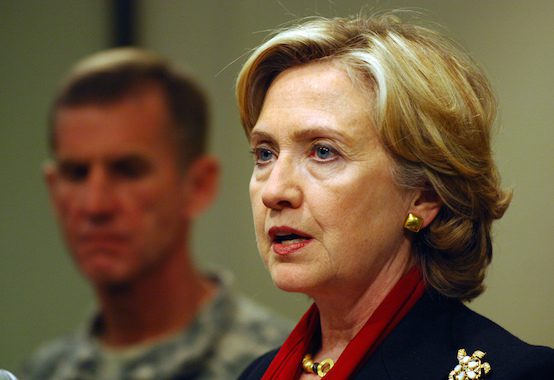Clinton’s American Legion Speech

Hillary Clinton’s speech to the American Legion in Cincinnati didn’t contain anything new or surprising. It was billed as an endorsement of “American exceptionalism” defined as support for activist foreign policy and global “leadership,” and that is what Clinton delivered. One thing that struck me while listening to it was the muted response from the audience. Despite Clinton’s fairly heavy-handed efforts to present herself as a friend of veterans and champion of the military, the crowd didn’t seem very impressed. The delivery of the speech was typically wooden, but then no one expects stirring oratory from Clinton. Either the audience wasn’t interested in what they were hearing, or they found Clinton to be a poor messenger, or both.
The substance was mostly boilerplate cheerleading for the status quo in foreign policy, but a few particularly jarring lines stood out. Near the start of the speech, Clinton said, “We are an exceptional nation because we are an indispensable nation. In fact, we are the indispensable nation.” That isn’t true, but Clinton’s acceptance of this claim confirms that she understands “American exceptionalism” in a particularly warped way that justifies interfering all over the globe. That is what Albright’s “indispensable nation” rhetoric meant twenty years ago, and it’s what Clinton’s rhetoric means today.
Clinton thought that she was dinging Trump when she said, “We can’t cozy up to dictators.” That would be all right if it were true, but it is hard to take seriously from a committed supporter of U.S. “leadership.” Cozying up to authoritarian rulers has been and continues to be a significant part of U.S. “leadership,” and if you are in favor of the latter you are going to be stuck with the former. This rhetoric is especially absurd coming from someone who has repeatedly stressed the importance of supporting U.S. clients in the Gulf. Clinton has made a point of promising that the U.S. will stay quite cozy with our despotic clients when she is president, and it is likely that the U.S. will probably get even cozier still if she has anything to say about it.
Overall, Clinton’s speech could have been given by a conventional Republican hawk, and some of the lines could have been lifted from the speeches of some of this year’s Republican presidential contenders. There were brief nods to the nuclear deal with Iran and New START that a Republican wouldn’t have made, but they were only mentioned in passing. Clinton insisted that “America must lead” and conjured up a vision of the vacuums that would be created if the U.S. did not do this. This is a standard hawkish line that implies that the U.S. always has to be involved in conflict and crises no matter how little the U.S. has at stake in them.
At one point, Clinton asserted, “Defending American exceptionalism should always be above politics.” That amounts to saying that our foreign policy debates should always be narrowly circumscribed and most of our current policies should always remain beyond challenge or major revision. That’s not healthy for the quality of our foreign policy debates or our foreign policy as a whole, and it shows the degree to which Clinton is out of touch with much of the country that she thinks this is a credible thing to say.